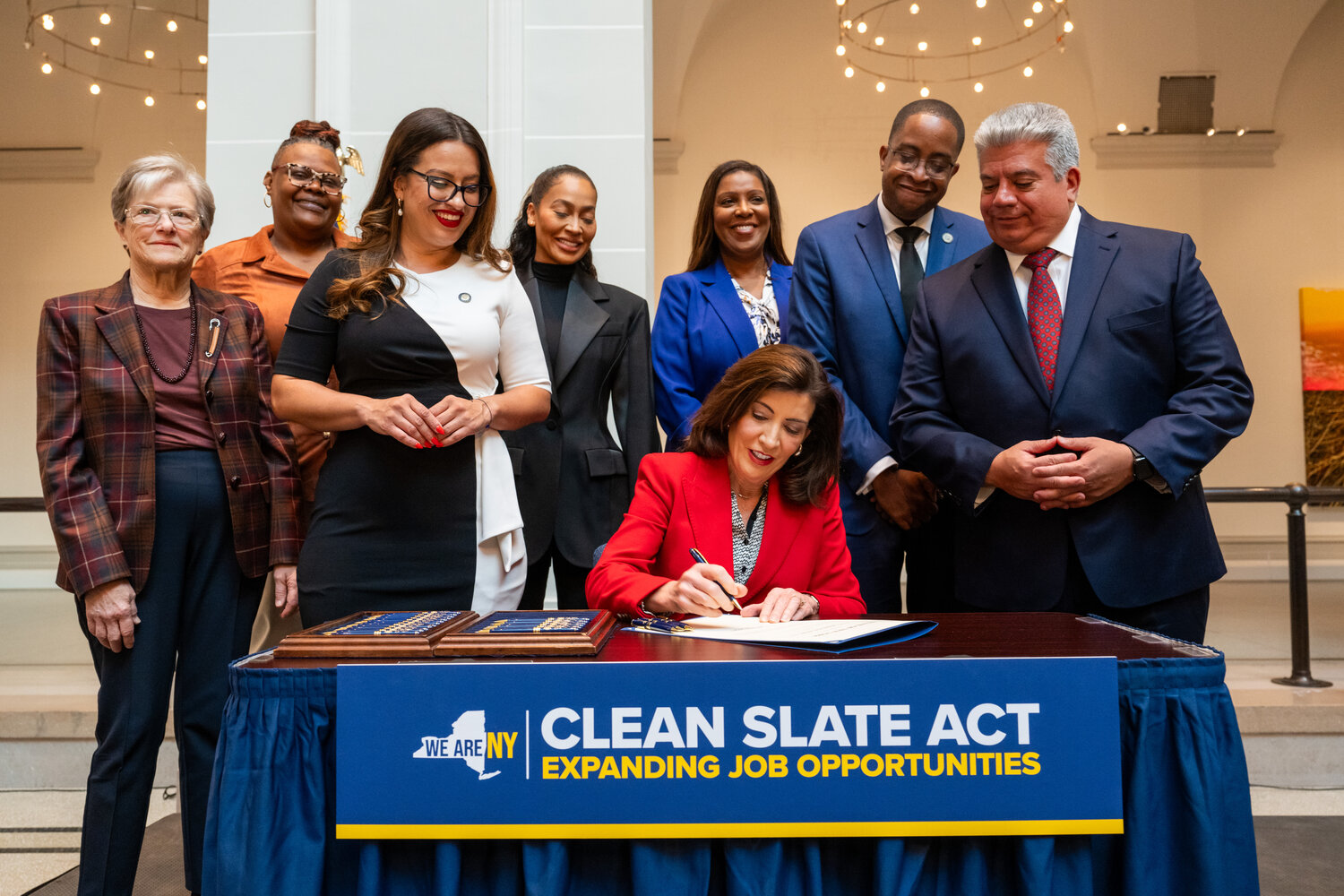Clean Slate Act will give those with past criminal records a second chance
Clean Slate Act sparks controversy — and hope
Many in the community are no strangers to uphill battles, but for the hundreds — if not thousands — who carry the weight of past convictions, the journey toward a brighter future has often felt like one that is impossible to win.
But for them — and roughly 2 million others throughout the state — Gov. Kathy Hochul has taken what she says are the first steps aimed at reducing the chance of those with past records returning to jail, allowing them a second chance — or a “clean slate,” if you will.
Hochul’s bill, dubbed The Clean Slate Act, is intended to grant those with criminal records the opportunity to have their past convictions sealed — including those with drug offenses — so long as they complete their sentences and stay out of trouble for a set amount of time after their release — three years for misdemeanors, and eight years for felonies — excluding sex offenses, murder, and other violent crimes.
Hochul expressed pride signing the bill into law on Nov. 16, allowing New York to join a dozen other states with similar initiatives aimed at dismantling the prison system’s revolving doors by providing resources and economic opportunities to formerly incarcerated people, such as access to expungement, jobs and housing.
“The impact of this bill cannot be understated,” said Assemblywoman Taylor Darling, who represents Uniondale. “The automatic sealing of conviction records will bring an end to the unjust and perpetual punishment millions of residents have faced due to their conviction records. Individuals will no longer be denied access to employment, housing and education, but instead, will have the opportunity to fully participate and thrive in their communities.”
Sergio Argueta, a local activist and resident who turned his life around after experiencing multiple arrests as a youth, believes The Clean Slate Act is an amazing step forward, but the STRONG founder feels there is still more work to be done for the formerly incarcerated in and around Uniondale.
“A lot of the individuals that are serving serious time upstate are oftentimes from some of the most marginalized and disenfranchised communities in New York,” said Argueta, whose Uniondale-based organization is dedicated to providing resources and helping formerly incarcerated young people get back on track in life.
“As a young man, I grew up in Uniondale seeing a lot of my friends become involved in the juvenile justice system,” he explained, adding that the impacts felt due to the generations of systemic oppression, the war on drugs, and mass incarceration that has been targeting this community — won’t be solved with just this one law.
According to Vera, a national organization committed to combatting mass incarceration, Black residents only account for 13 percent of the county’s total population, yet simultaneously make up 81 percent of Nassau County’s current incarcerated population — most of which, according to Argueta, are from the Uniondale, Hempstead, Roosevelt, Westbury, and Freeport areas, as well as other neighboring communities that have also been historically underfunded.
“The best way to rehabilitate and transform individuals and communities is to remove oppressive systems that serve as barriers of progress,” Hempstead village mayor Waylyn Hobbs said, “I believe once a person has served their time, rehabilitation begins with opportunity, and this bill will help fight against poverty and increase labor equity in our communities.”
This bill won’t go into effect until a year from now, meaning the full impact of this legislation won’t be felt by those who are currently waiting to seal their records, for at least the next four years, due to the waiting period for misdemeanors.
The Nassau County Police Benevolent Association — the union representing law enforcement in the county — did not respond to a request for comment on the legislation, but other PBAs — such as the one in Suffolk County — were not so enthusiastic about it.
“When you have law after law that emboldens criminals, that tells them they are not accountable for their actions — it certainly demoralizes your law enforcement officers,” said Suffolk PBA president Lou Civello, in a statement, “those of us that are out there every day risking our lives to make this a safer place to live.”
While acknowledging the criticisms surrounding the law, Hochul said the public’s safety remained paramount to her.
“My number one job as the governor is to keep people safe,” Hochul said. “I believe that the best anti-crime tool we have is a job when people have steady work.”
Argueta believes when individuals make a mistake, they should be held accountable. But they should also be allowed to atone for those mistakes, and be given an opportunity to right their wrongs — something he believes the Clean Slate Act accomplishes.
“Those who truly care about law enforcement would want to see positive changes and measures enacted that are proven to drive down crime and prevent repeat offenders,” Argueta said, like in Michigan — where he said just 4 percent of those with sealed criminal records returned to jail, mainly for non-violent misdemeanors, referencing a report by the Cato Institute.
“We should be spending way more on trying to prevent our kids from walking down a bad path and engaging in unlawful activities,” he said. “Until we start really funding the resources and opportunities in our communities, the educational systems, reversing the impacts of the war on drugs and poverty. And until it's equitable to what we spend incarcerating and monitoring individuals — when those expenditures are on equitable footing as keeping somebody out of prison — I think that's when we'll know we've arrived.”











